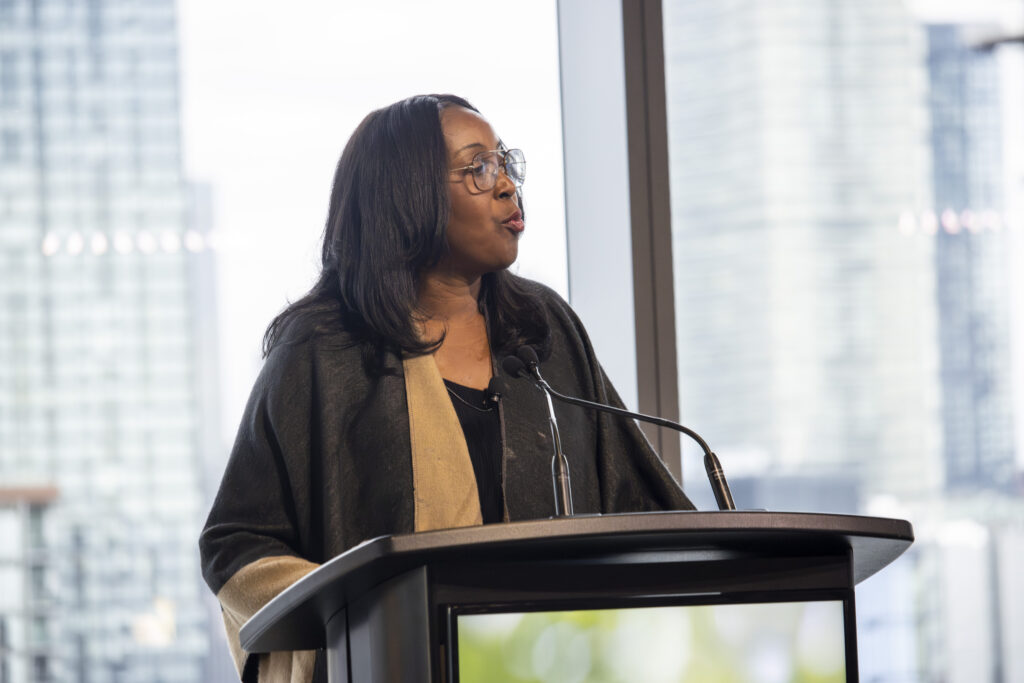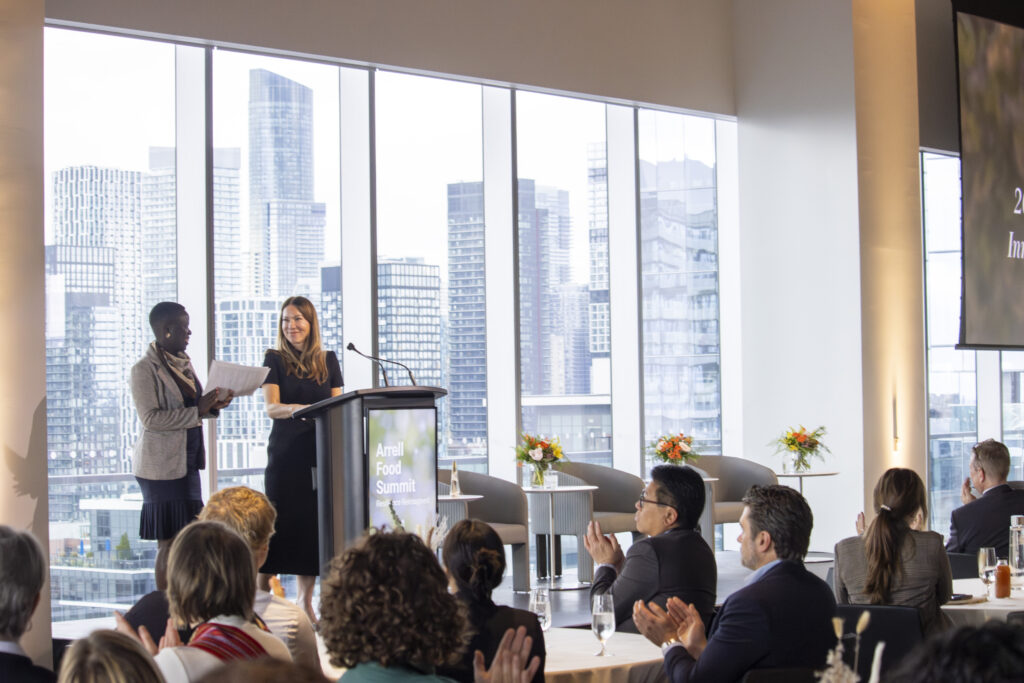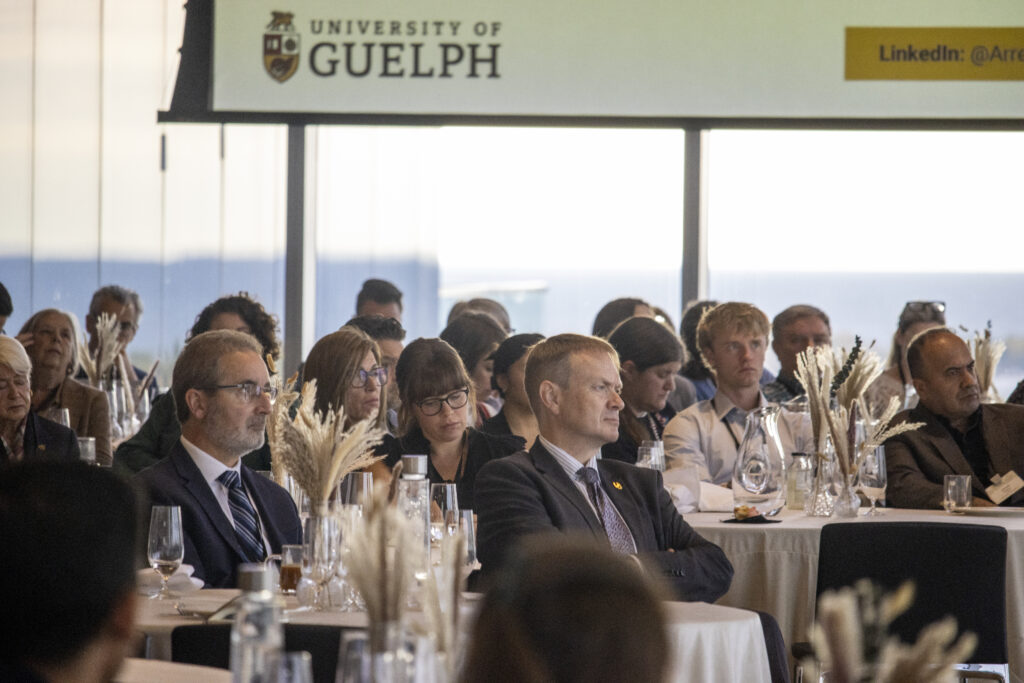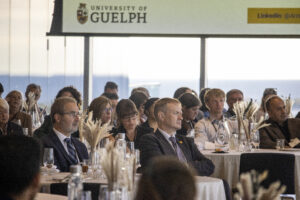The 2025 Arrell Food Summit, held at the Globe and Mail Centre in Toronto, reminded attendees that resilience within the food system is not a buzzword, it’s a call to action. Under the theme “Resilience Reimagined: Redesigning Food Systems for a Changed World”, the Arrell Food Institute (AFI) convened a timely and essential conversation with policymakers, entrepreneurs, farmers, Indigenous leaders and global thinkers to explore how food systems must evolve in the face of climate change, economic uncertainty and social inequity.
Across the panels and fireside chats, one message rang clear: resilience is not about getting back to normal, it’s about making something better. The hard questions that remain are what needs to be improved, what needs to be torn down entirely and rebuilt and who shoulders the weight of the work within Canada’s food system.
“Resiliency in our food system isn’t about surviving,” said Devita Davison. “it’s about maintaining your humanity while you do it”.

The summit opened with an international panel, taking a deep dive into the upcoming USMCA. Here panelists emphasized the importance of using agriculture as a strategic lever in shaping North American economic relationships, and equalizing roles in the tumultuous situation evolving between the three nations.
“[Food] is one thing that… if you cannot go buy the new truck that you wanted, you can get by without it. You cannot get by… without eating.” Juan Carlos Baker Pineda, CEO and Founding Partner at Ansley Consultores Internacionales shared.
Expanding on the perspective around the US-Canada relationship, Devita Davison’s keynote blended lived experience with critical theory to challenge summit attendees to rethink charity-based food security response models, advocating for a community-rooted approach that centers equity and cultural relevancy. Given the growing inequity in both economic and food access, this challenge reminded the audience that “the system is working as designed… that is not a bug, that is a feature”.
This theme was reinforced by the fireside chat on Indigenous Foodways, where the push for trust and policy change was called for to support Indigenous-led solutions. After showcasing some case studies of the success that follows community empowerment, Kallie Wood, President and CEO of the National Circle for Indigenous Agriculture and Food (NCIAF) emphasized the importance of Indigenous-led solutions that place the agency and power within a community to drive growth and engagement from within. Wood then powerfully called on the audience to “go back to your communities and your home fires, take a look at what your reconciliation plan is. If it’s just a check box, and it’s just a report monthly or yearly to the person you report to… what does it truly mean in Canada to make a difference?”
From the community focus, a return from the lunch hour saw a return to a more international conversation. Irene Etyang, a founder and community leader in Kenya, accepted the 2025 Arrell Global Food Innovation Award on behalf of MAMLO FOODS. Demonstrating how enterprise can drive social change, MAMLO’s approach shortens supply chains and uplifts communities from within, embodying the core of this year’s, summit theme. “Transformation grows from the roots of who we are,” Etyang said. “The people, the land, and our knowledge.”

Spotlighting how corporations can support large-scale regenerative agriculture, Galen Weston shared insights into the newly announced Million Acre Challenge. This $50 million initiative will support stewardship and regenerative practices in Canadian agriculture, emphasizing the value of long-term thinking over short-term gains for corporations. “Decades are much more important to us than quarters.” He shared, “And when you look at decades, social trends, environmental trends, and demographic trends, these are all things that predict the future of the businesses that we are in. And so having a view of where they’re going and making business related decisions in the face of those things matters a lot.”
The Summit finished with back-to-back panels on ag-tech innovations and resilience retooling, demonstrating how rapidly evolving technology creates opportunity that must be guided by human needs and smart policy to strengthen, not sideline, the human element in the sector. “To build resilient food systems for the future, technology must act as an enabler,” said Hamed Hamedian. “It’s not only about designing smarter systems, but about building meaningful ones.”

A Shared Vision for the Future
From grassroots movements to global trade, from Indigenous sovereignty to corporate responsibility, this year’s Arrell Food Summit painted a picture of a food system that is adaptive, inclusive, and deeply human.
Requiring collective effort, Canada’s food system future depends on bold action, deep collaboration and a steadfast commitment to equity.

Ready to learn more?
Visit the official resource hub for the 2025 Summit. This hub provides session overviews, link to resources, session recordings, and supporting materials from the event.